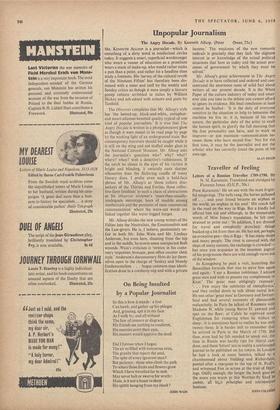Traveller of Feeling
Letters of a Russian Traveller 1789-1790. By N. M. Karamzin. Translated and abridged by Florence Jonas. (O.U.P., 30s.) POOR Karamzin! He set out with the most fright- ful misgivings. 'The bells rang, the horses galloped off . . . and your friend became an orphan in the world, an orphan in his soul.' His coach fell in the mud on the way to Riga. But a kindly lad offered him aid and although, in the memorable words of Miss Jonas's translation, he felt con- strained to point out : 'In addition, I am dressed for travel and completely drenched,' things bucked up a bit from then on. He has not, perhaps, an evocative pen—this is Riga : 'It has many shops and many people. The river is covered with the ships of many nations, the exchange is crowded'— but once you acquiesce in the impotent jogtrot of his progression there are wild enough views out of the window.
In Konigsberg he paid a visit, launching the Boswellian formula that was to serve him again and again: 'I am a Russian nobleman. I admire great men and wish to present my compliments to Kant.' The great man obligingly rejoined: . . Few enjoy the subtleties of metaphysics.' and they settled down to talk about moral law. He met other 'great men' in Germany and Switzer- land and had several moments of pleasurable melancholy. In Paris he talked of Rousseau with Madame N. while young Baron D. yawned and spat on the floor; at Calais he reproved some Englishmen for roistering when he wished to sleep: it is sometimes hard to realise he was only twenty-three. It is harder still to remember that he arrived in Paris in the March of 1790. But then, even had he felt minded to speak out, the time in Russia was hardly ripe for liberal can- dour, and these 'letters' are in reality a sentimental journal to be published on his return. In London he had a look at some lunatics, talked to a chambermaid about • Fielding and Richardson, panted after a marquise to the top of St. Paul's, and witnessed Fox in action at the trial of Hast- ings. Oddly enough, the longer the book goes on the more you warm to this Werther-fly fixed in amber, all bil,h principles and unconscious humour.
JOHN COLEMAN










































 Previous page
Previous page